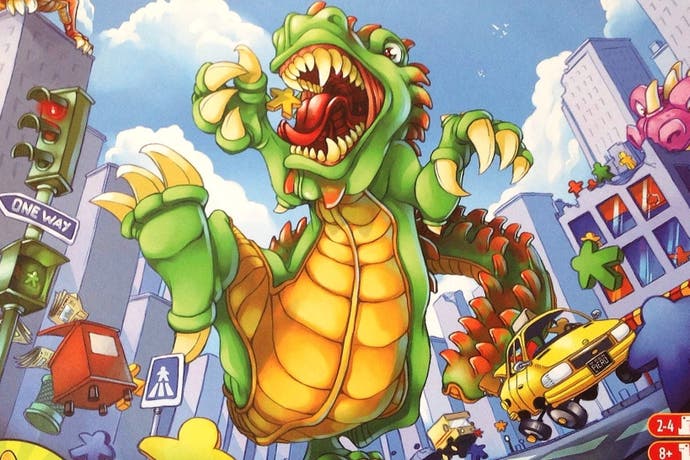Rampage review
A lot of hot air.
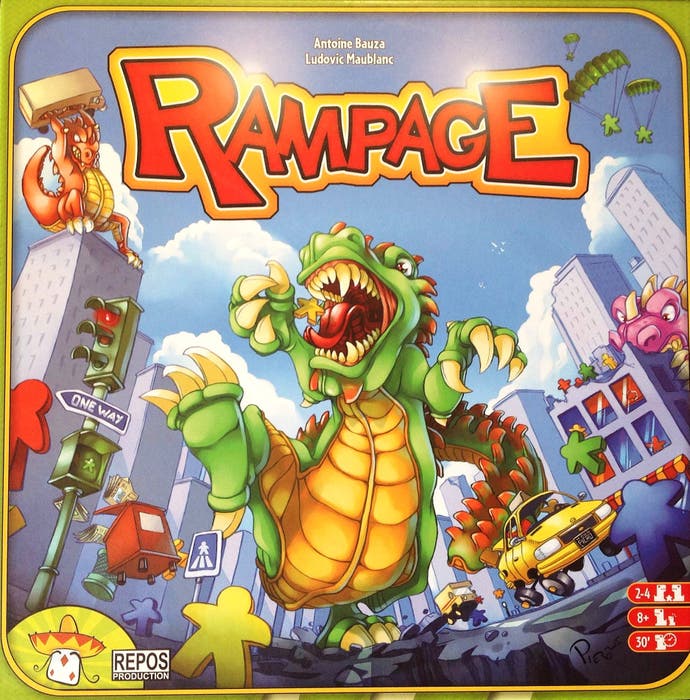
Price: £50 / Players: 2-4 / Time: 60 minutes
Oddly, for all the amazing board games being published these days, not many take advantage of the fact that they're physical objects. 2010's Catacombs mixed dungeon crawling with billiards, where landing an attack was as simple (or complicated) as flicking your adventurer into one or more monsters. More recently, Two Rooms and a Boom showed how much game you can get out of a real-life wall. Then there's the perennially popular Jungle Speed, a French card game of racing to grab a wooden totem in which you face the very real risk of breaking your fingers in the process.
These are all great games, and Rampage makes every one of them look as dull as ditchwater.
In Rampage, everybody plays a big, stompy kaiju monster, and the game ends when you've all levelled the city - which is to say, when you've flattened the board. Like a board game from the '80s (think of the merciless TV advertising, the photogenic kids shouting and high-fiving), a game of Rampage starts by offering you an immaculate, three-dimensional city, and wants you to delight in knocking it over. At the end of the game, the player who caused the most destruction to the city, its inhabitants and the other monsters is the winner.
You'll do this by performing two actions on each turn, picked from a list of four, each trickier and stranger than the last. You can move across the city by lifting your monster and flicking the wooden disc representing their feet. If you're touching the tiny strip of pavement around a building, you can try and demolish it by picking up your monster and dropping it on the building. If you're next to a car you can "throw" it by placing it on your monster's head, then flicking it off. Finally, you've got a breath weapon, which is literally your own breath. You place your chin on your monster's head and blow, inevitably coating the game in a fine spatter of spittle. At the end of your turn, any hapless bystanders at your feet are gobbled up.
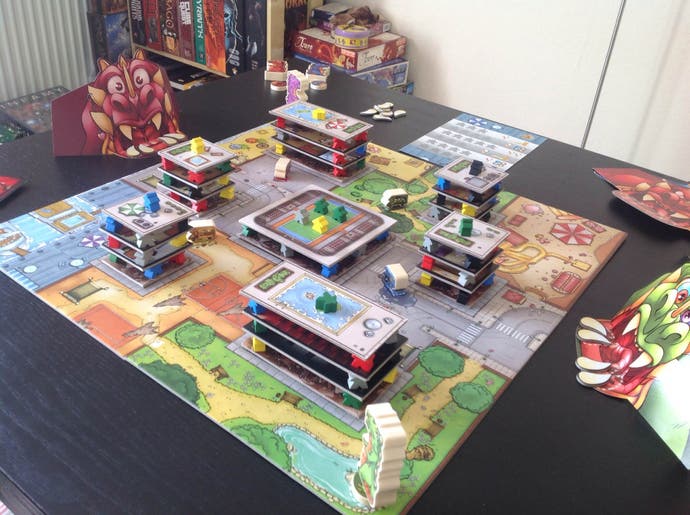
A silly game, then. Or is it? Actually, Rampage's final few rules arrive like a military task force, transforming the above comedic framework into a fascinating arena. One: Any civilian that leaves the board on your turn is considered to have "fled", and players get punished for any civilian who escapes on their turn. Two: You actually only get points for sets of coloured civilians. Three: You can only eat as many humans on your space as you have teeth, and you can knock out your opponents' teeth for extra points.
Just like that, this absurd game of blowing over cardboard apartment blocks becomes implausibly tense and tactical, and you and your psychotic monster are expected to work with the grace and efficiency of a demolition crew. You'll find yourself ricocheting your movement disc off one building to end up next to that one delicious red bystander - or on your knees, trying to figure out if you could blow that blue person clean out of a house, neatly flattening it in the process.
Now, there are a few rewards that the genre of dexterity games can offer a designer, and Rampage nails absolutely all of them. When a game uses the players' own bodies, you often need fewer rules because players are (hopefully) intimately familiar with the laws of physics. As is the case with Rampage, it's priceless to have a game that you can explain in 60 seconds and then get straight into the business of laughing, swearing and accidentally spitting on the board.
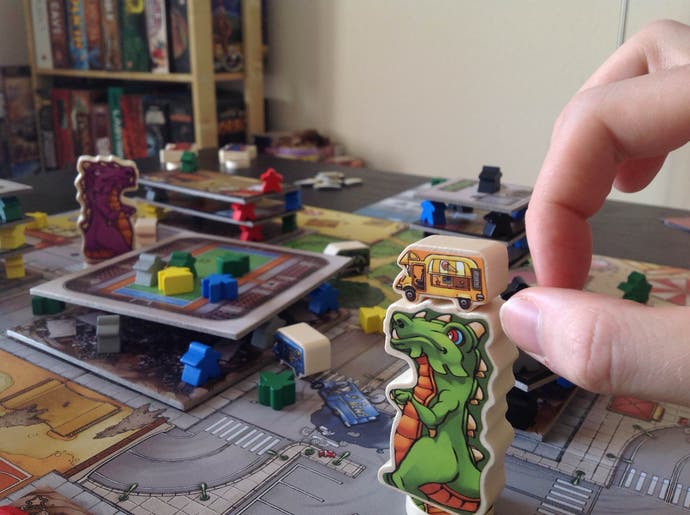
A still greater reward, though, is that every player's turn can become a spectacle. When Rampage is riotously unfair and your friend's monster bounces ineffectually off the roof of a pristine house? You're going to laugh. When your friend picks up a camper van and flicks it the entire length of the board to effortlessly flatten another monster? You'll cheer. Dexterity games give you a reason to delight in your friends' successes and giggle at their failures, which is huge - although it does make this cardstock crucible a poor fit for shyer players.
The final rules in Rampage relate to the three cards everyone is dealt before the game begins.
You all get a Character card, relating to how you score, and a Power card that makes you a little different. Maybe you're a Climbing Brawler, who can scamper up buildings and wants to claim as many monster teeth as possible. Or maybe you're a Young Kung-Fu Master, who wants to eat all the old (grey) figures on the board and can always perform a flying kick by flicking their movement disc off their head. Finally, you get a secret, once-per-game Secret Super Power card, including the entirely gross "Passionate Kiss", which allows you to steal civilians from the mouth of another monster in your district.
Inventive as they are, these cards don't quite work. They're a deluge of things to remember in what was, before, quite an economically designed game. If a player uses them badly, they are only going to bog down the game, and if a player uses them expertly, everyone's going to be looking at them enviously. And probably trying to ping fire trucks off their head.
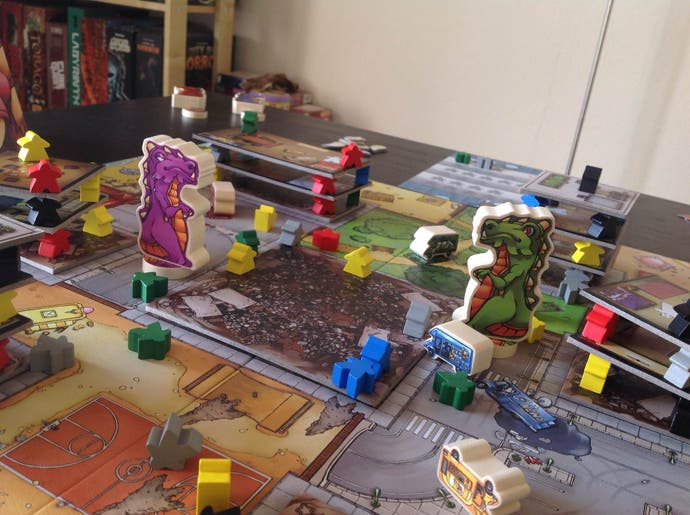
But play without the cards and it becomes still clearer that Rampage is reaching for two audiences and doesn't quite sate either of their terrible appetites.
On one side you've got families and non-gamers, drawn in by the game's cartoon art and silly nature. Rampage asks that they be comfortable with getting beaten up and having delicious civilians snatched out from under their feet, and that they cope with a cold-hearted set-collection scoring mechanism in which it can become clear to you, two-thirds of the way through the game, that you're not going to win.
On the other hand, the more demanding demographic of gamers gets a challenge that's fun... until it's not. Everything that's great about Rampage is conditional rather than being intrinsic to every turn. What happens when your friends aren't making funny mistakes? Or when the board layout sees you having to spend your turn simply moving, then waiting for your turn again while your friends continue to rack up points? Speaking of racks, the reason pool works is that there's always a shot you can try and make. Rampage can't make that boast.
All of which makes it a tricky thing to recommend. But despite the size of that box, I'll absolutely be finding space for it in my tiny London flat, because it's just such a brilliant curio. No, I won't get it to the table more than a couple of times a year. But some things are more important than practicality - like owning a three-dimensional kaiju city destruction board game that's unlike anything that's ever been made.
If you find that sentence ringing in yours ears, perhaps you should pick up a copy, too.
Quintin is the editor of Shut Up & Sit Down, a board game review site. Visit it for more coverage of this strange cardboard realm.
